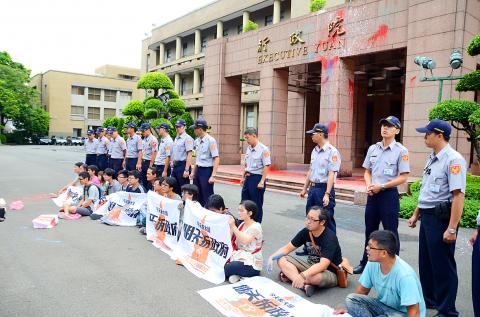Dozens of protesters against the forcible demolition of houses in Miaoli County’s Dapu Borough (大埔) were able to get close enough to the Executive Yuan in Taipei yesterday to throw eggs and paint at the building after they disguised themselves as Chinese tourists.
Carrying bags from souvenir and specialty shops and following a “tour guide” waving a small hand-held flag, the group of more than 30 protesters did not arouse much attention as they walked from the Sheraton Hotel Taipei across the street to the Executive Yuan.
However, as the group neared the front gate of the Executive Yuan, they suddenly began sprinting toward the building’s front door.

Photo provided by Taiwan Rural Front
Shouting: “The government tore down Dapu, and the people will tear down the government,” the protesters tossed eggs and paint at the building.
Taken by surprise, the police officers at the front gate managed to grab only two of the protesters as they entered the compound.
Those that made it inside the gate, after throwing the eggs and paint, sat down and continued chanting, calling on the government to return the land it has expropriated from people and to amend the law to ban forced expropriation.
Not long after the sit-in began, police officers moved into to remove the protesters, but not before asking reporters and photographers on the scene to leave.
When Public Television Service reporter Edd Jhong (鐘聖雄) insisted that it was his right as a reporter to be at a news scene, he was grabbed by police officers.
“They originally were going to throw me out of the Executive Yuan, but I kept struggling, so they gave up,” Jhong said. “A public relations official from the Executive Yuan came out and said she could stay with us [the media]. She asked the police to leave us alone, but a plainclothes officer challenged her, asking if she would take full responsibility for the decision.”
“This was clearly an effort to repress the freedom of the press,” Jhong said.
When asked about the protest later in the day, Executive Yuan spokesperson Cheng Li-wun (鄭麗文) appealed for calm.
It is normal in a democracy for people to voice their opinions and fight for their rights, but they should do so in a rational and legal manner, she said.
Cheng said the Executive Yuan has told police officers in the district to increase their patrols.
However, it told them that police officers should uphold the rule of law when carrying out their duties and urged government agencies and officials at all levels to increase their communications with the public in cases where the public’s interests are affected, Cheng said.
The protest did not disturb the Cabinet meeting that was taking place inside the building at the time, nor was it discussed at the meeting, Cheng said.
Additional reporting by Shih Hsiu-chuan

TRAGEDY STRIKES TAIPEI: The suspect died after falling off a building after he threw smoke grenades into Taipei Main Station and went on a killing spree in Zhongshan A 27-year-old suspect allegedly threw smoke grenades in Taipei Main Station and then proceeded to Zhongshan MRT Station in a random killing spree that resulted in the death of the suspect and two other civilians, and seven injured, including one in critical condition, as of press time last night. The suspect, identified as a man surnamed Chang Wen (張文), allegedly began the attack at Taipei Main Station, the Taipei Fire Department said, adding that it received a report at 5:24pm that smoke grenades had been thrown in the station. One man in his 50s was rushed to hospital after a cardiac arrest

A car bomb killed a senior Russian general in southern Moscow yesterday morning, the latest high-profile army figure to be blown up in a blast that came just hours after Russian and Ukrainian delegates held separate talks in Miami on a plan to end the war. Kyiv has not commented on the incident, but Russian investigators said they were probing whether the blast was “linked” to “Ukrainian special forces.” The attack was similar to other assassinations of generals and pro-war figures that have either been claimed, or are widely believed to have been orchestrated, by Ukraine. Russian Lieutenant General Fanil Sarvarov, 56, head

SAFETY FIRST: Double the number of police were deployed at the Taipei Marathon, while other cities released plans to bolster public event safety Authorities across Taiwan have stepped up security measures ahead of Christmas and New Year events, following a knife and smoke bomb attack in Taipei on Friday that left four people dead and 11 injured. In a bid to prevent potential copycat incidents, police deployments have been expanded for large gatherings, transport hubs, and other crowded public spaces, according to official statements from police and city authorities. Taipei Mayor Chiang Wan-an (蔣萬安) said the city has “comprehensively raised security readiness” in crowded areas, increased police deployments with armed officers, and intensified patrols during weekends and nighttime hours. For large-scale events, security checkpoints and explosives

PUBLIC SAFETY: The premier said that security would be tightened in transport hubs, while President Lai commended the public for their bravery The government is to deploy more police, including rapid response units, in crowded public areas to ensure a swift response to any threats, President William Lai (賴清德) said yesterday after a knife attack killed three people and injured 11 in Taipei the previous day. Lai made the remarks following a briefing by the National Police Agency on the progress of the investigation, saying that the attack underscored the importance of cooperation in public security between the central and local governments. The attack unfolded in the early evening on Friday around Taipei Main Station’s M7 exit and later near the Taipei MRT’s Zhongshan